You love your bird and want to provide them with the best care possible. You may be unaware that relying solely on a seed diet can be harmful to your feathered friend’s health. While seed diets may seem like a convenient and easy option, they actually lack the necessary nutrients your bird needs to thrive.
It’s not your fault if you’ve been feeding your bird a seed diet exclusively. Many bird owners have been misinformed about the proper nutritional needs of their feathered friends. However, it’s important to understand that a seed diet alone can lead to a variety of health issues, including malnutrition, obesity, and even death.
In this article, you will learn how to optimize your bird’s nutrition and provide them with a more balanced and healthy diet.
Key Takeaways
- A seed-only diet can harm a bird’s health and cause malnutrition, obesity, and organ failure.
- A balanced diet that includes fresh fruits and vegetables, pellets, and healthy treats in moderation is crucial for a bird’s physical and mental well-being.
- Understanding a bird’s nutritional needs and regularly consulting with an avian veterinarian is important for their health and longevity.
- Nutritional supplements can help fill in gaps in a bird’s diet, but should only be added after consulting with a veterinarian, and monitoring a bird’s weight and behavior can help identify health issues.
The Risks of Relying Solely on Seed Diets
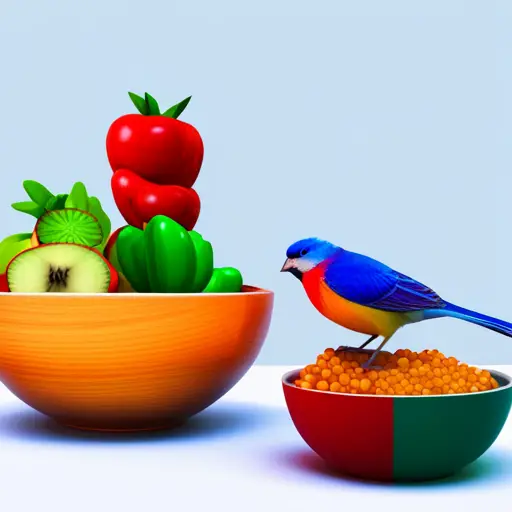
If you’re only feeding your bird seeds, you’re putting them at risk for serious health problems. Nutritional deficiencies are common in seed-based diets, which can lead to long term effects on your bird’s health. Over time, a lack of essential vitamins and minerals can cause issues such as weakened immune systems, feather plucking, and even organ failure.
While seed diets may be convenient and affordable, they’re not sufficient to meet all of your bird’s nutritional needs. It’s important to understand what your bird requires in terms of protein, carbohydrates, and other essential nutrients. By providing a balanced diet, you can help your bird thrive and avoid the negative consequences associated with a seed-only diet.
Understanding Your Bird’s Nutritional Needs
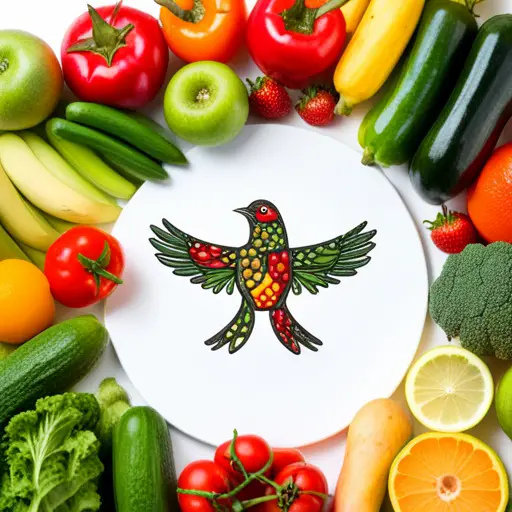
Sure, you don’t need to worry about the health of your feathered friend, just feed them whatever you feel like.
But, if you want your bird to live a long and healthy life, you need to understand their nutritional needs.
Providing your bird with a balanced nutrition is crucial for their physical and mental well-being. A seed-only diet lacks many essential nutrients, vitamins, and minerals that your bird needs to stay healthy. This can lead to serious health issues, such as obesity, malnutrition, and even death.
To ensure your bird is getting all the necessary nutrients, you should consider adding dietary supplements to their diet. Supplements like vitamins and minerals can help fill in the gaps that a seed-only diet leaves behind. However, it’s important to remember that supplements are not a substitute for a balanced diet. They should only be used as a supplement to a nutritionally complete diet.
By understanding your bird’s nutritional needs and providing them with a balanced diet, you can help ensure they live a long and healthy life. So, how can you introduce variety to your bird’s diet?
Introducing Variety to Your Bird’s Diet
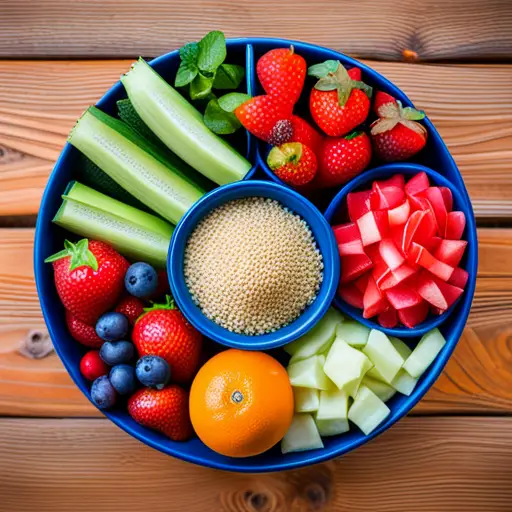
Adding different types of food to your feathered friend’s menu can be an exciting way to keep them healthy and happy. One way to introduce variety into your bird’s diet is to offer fresh foods, such as fruits and vegetables. These provide essential vitamins and minerals that may be missing in seed diets.
Try offering your bird small pieces of apple, carrot, or leafy greens to start. You can also experiment with different textures and flavors to find what your bird likes best. Another way to optimize your bird’s nutrition is to incorporate pellet supplements into their diet.
Pellets are specially formulated to provide a balanced diet for birds and come in a variety of flavors and sizes. They are a great source of protein, fiber, and other essential nutrients that your bird may be lacking in their seed diet. It’s important to remember that pellets should not replace your bird’s seed diet entirely, but rather be used as a supplement to provide a more balanced nutrition.
Now that you know how to introduce variety to your bird’s diet, the next step is to provide safe and healthy treats.
Providing Safe and Healthy Treats
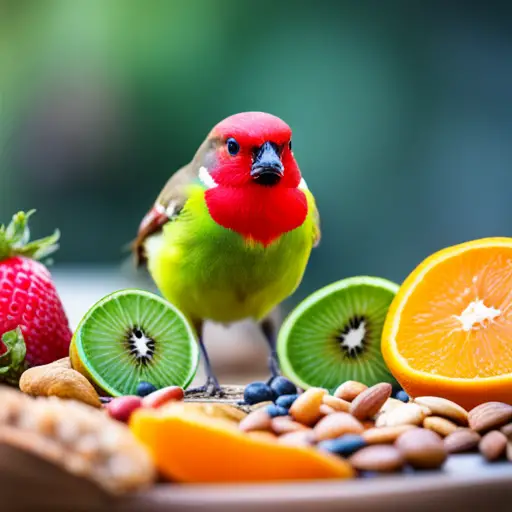
To keep your feathered friend healthy and happy, it’s important to provide safe and nutritious treats, just like a parent offers healthy snacks to their child to keep them fueled throughout the day.
When choosing treats for your bird, always opt for healthy options such as fruits, vegetables, and whole grains. Avoid sugary and fatty treats, as they can lead to health problems such as obesity and diabetes.
Remember to offer treats in moderation, as too much even of a healthy option can be harmful to your bird’s health. Treats should make up no more than 10% of your bird’s daily diet.
Additionally, make sure to offer treats in a way that promotes natural foraging behaviors, such as hiding treats in toys or scattering them around their enclosure.
By providing safe and healthy treats in moderation, you can help keep your bird happy and healthy.
As you strive to provide the best nutrition for your feathered friend, it’s important to monitor their health and nutrition regularly. This includes keeping an eye on their weight and observing any changes in their behavior or appearance.
By staying vigilant and making adjustments to their diet as needed, you can help ensure your bird lives a long and healthy life.
Monitoring Your Bird’s Health and Nutrition
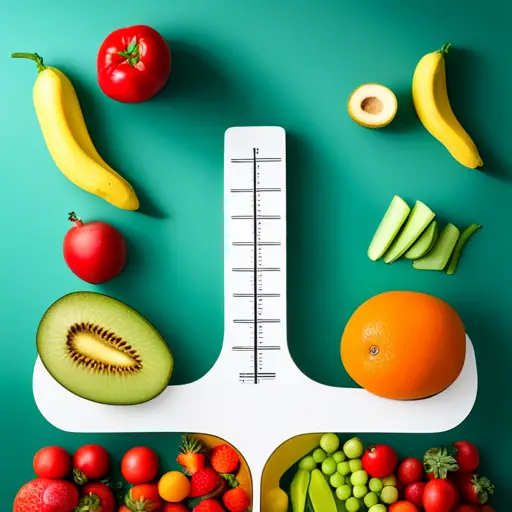
Keeping your feathered friend healthy requires regular monitoring of their weight and behavior, so it’s important to pay close attention to any changes that may indicate a problem.
One way to do this is by scheduling regular check-ups with your avian veterinarian, who can assess your bird’s overall health and recommend any necessary changes to their diet or care.
Additionally, keeping track of your bird’s weight can help you identify any sudden drops or increases that may indicate a health issue.
In addition to regular check-ups, providing your bird with nutritional supplements can also help optimize their health and nutrition. These supplements can include vitamins and minerals that may be lacking in their diet, as well as probiotics to promote healthy digestion.
However, it’s important to consult with your veterinarian before adding any supplements to your bird’s diet, as some may be harmful in large doses.
By regularly monitoring your bird’s health and providing them with the necessary supplements, you can help ensure they are getting the best possible nutrition and care.
Conclusion
Well, congratulations! You’ve made it to the end of this article about optimizing your bird’s nutrition. Hopefully, you’ve learned that relying solely on seed diets is a big no-no, and that there are other ways to ensure your feathered friend is getting all the nutrients they need.
But let’s be real here. Who has the time and energy to constantly monitor their bird’s diet and health? I mean, you’ve got a life to live, right? So, just keep giving your bird those seeds and hope for the best! Who needs a healthy and happy pet anyway? It’s not like they can talk or anything, am I right?
Okay, that was a bit harsh. But in all seriousness, taking care of your bird’s nutrition is important for their overall health and well-being. Don’t be afraid to introduce some variety into their diet and provide them with safe and healthy treats.
And always keep an eye on their health and nutrition, because a happy and healthy bird is a happy and healthy you!
